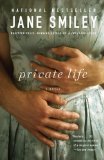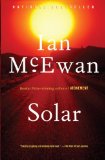Summary | Excerpt | Reading Guide | Reviews | Beyond the book | Read-Alikes | Genres & Themes | Author Bio

From the book jacket: Sandy Glass, a charismatic publicity-seeking oncologist, and Marion
Mendelssohn, a pure, exacting scientist, are co-directors of a lab at the
Philpott Institute dedicated to cancer research and desperately in need of a
grant. Both mentors and supervisors of their young postdoctoral protégés, Glass
and Mendelssohn demand dedication and obedience in a competitive environment
where funding is scarce and results elusive. So when the experiments of Cliff
Bannaker, a young postdoc in a rut, begin to work, the entire lab becomes giddy
with newfound expectations. But Cliff’s rigorous colleague–and girlfriend–Robin
Decker suspects the unthinkable: that his findings are fraudulent. As Robin
makes her private doubts public and Cliff maintains his innocence, a
life-changing controversy engulfs the lab and everyone in it.
Comment: In an interview in the Washington Post last year the interviewer
commented that Goodman's first two novels were about the search for spirituality
and asked if Intuition was about the search for a different kind of truth
- scientific truth? To which she replied:
"The themes in this book resonate with themes that I've dealt with in previous work. I see similarities between the search for spiritual truth and the search for truth about the world that scientists embark on. The book is very much about faith and doubt. It's about religious people, except that their religion is science."
She set Intuition in the 1980s because it was the time period in which people started to get very alarmed about the specter of scientific fraud, and there was a great interest in scientific oversight. She started writing Intuition around 2002 but it took four years to complete so, serendipitously, it was published relatively soon after two major health scandals (the South Korean cloning scandal of late 2005, and the Vioxx heart scare of 2004) which added an additional degree of relevancy to her tale. However, she emphasizes that she does not consider herself an op-ed writer:
"I started this book four years ago, but writing about lying and dissembling turned out to be a fairly topical subject. I was interested in the struggle of scientists and creative people working under tremendous pressures of time and money. I have a huge amount of sympathy for those people. I believe 99.99 percent of scientists are honest and truthful -- we read the headlines about a very tiny minority -- but small groups of people under tremendous pressure and how that affects their relationships with each other are a great subject for me as a writer."
Other than one negative review, all media reviews found for Intuition
positively glow with praise. The one negative voice was by fellow author
Sue Halpern writing in The New York Times who felt that Intuition is
"fuzzy" because it fails to make it clear whether Cliff, the novel's putative
villain, is delusional, bad at his work or actually on to something.
Halpern goes on to say that Intuition is full of querulous people whose
emotional tics stand in for personality," and that the novel's messages are
mixed to the point that Goodman's "moral compass seems to spin around, depolarized."
The consensus of the many other reviewers who pitched in about Intuition
is that it is another quiet but powerful novel from Goodman, possibly her best
to date, offering a highly contemporary and relevant inquiry into our society's
problematic matrix of science, money, and politics. She is praised for
creating a story that is subtle, vivid, incisive and funny and for illuminating
the inner lives of each of her characters without passing judgment on anyone,
and without any feeling of meanness or self-righteousness.
Browse the full range of reviewer opinion and an excerpt from Intuition at
BookBrowse, where you'll also find excerpts and reviews of Goodman's two earlier
novels.
![]() This review
first ran in the April 5, 2007
issue of BookBrowse Recommends.
This review
first ran in the April 5, 2007
issue of BookBrowse Recommends.

If you liked Intuition, try these:

by Jane Smiley
Published 2011
A riveting new novel from the Pulitzer Prize–winner that traverses the intimate landscape of one woman’s life, from the 1880s to World War II.

by Ian McEwan
Published 2011
Michael Beard is a Nobel prize–winning physicist whose best work is behind him, and whose fifth marriage is crumbling. However, an invitation to travel to New Mexico offers him a chance for him to extricate himself from his marital problems, reinvigorate his career, and save the world from environmental disaster. Can a man who has made a mess ...
Your guide toexceptional books
BookBrowse seeks out and recommends the best in contemporary fiction and nonfiction—books that not only engage and entertain but also deepen our understanding of ourselves and the world around us.